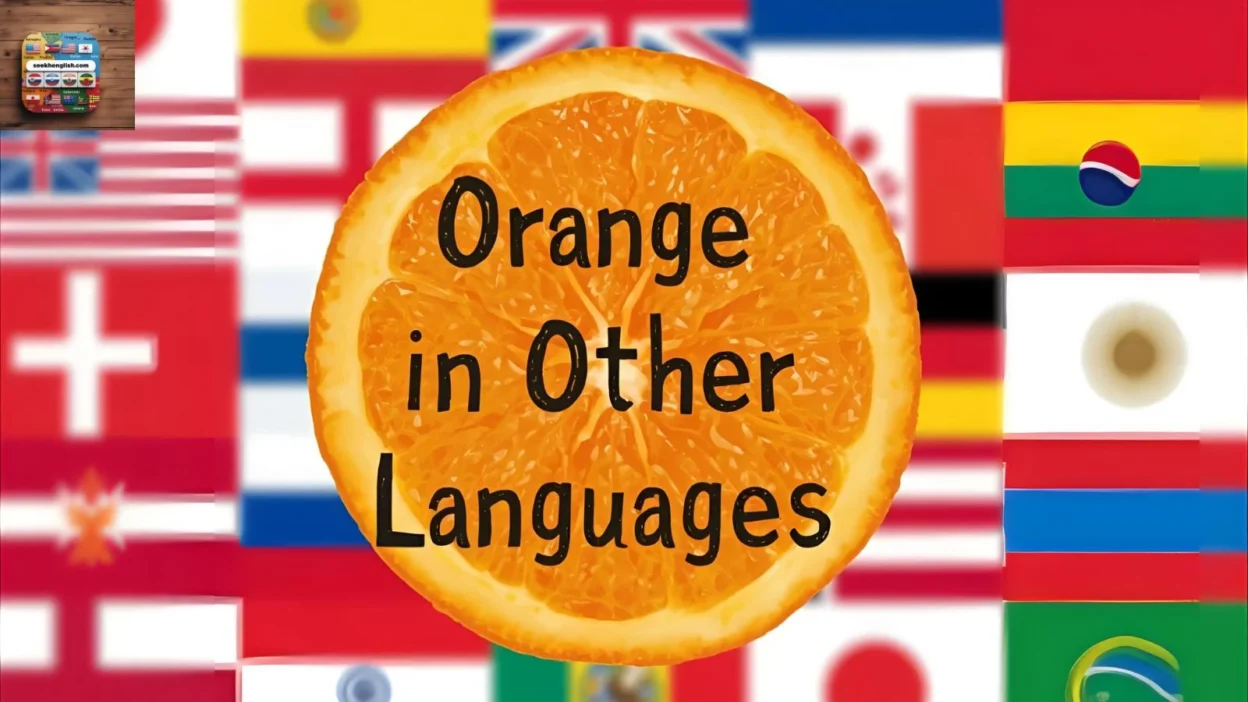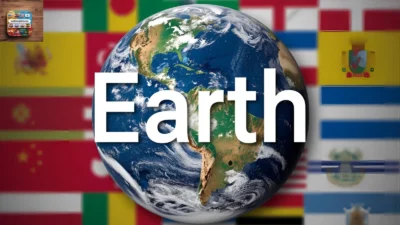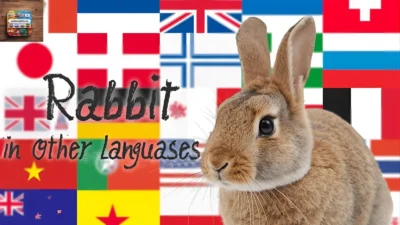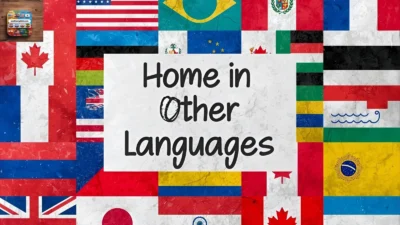The word orange is known across the globe, not only as a delicious fruit but also as a vibrant color that brightens our world. People often search for “orange in other languages” to learn new vocabulary, enhance cultural understanding, or communicate while traveling. Orange in Other Languages.
In this article, you’ll discover 85+ ways to say “orange” in different languages, along with easy pronunciations and example sentences. This will help you use the word correctly in conversations, whether you’re ordering fruit in a foreign market, describing colors in an art class, or teaching language to others.
Orange in Other Languages in 85 Different Languages
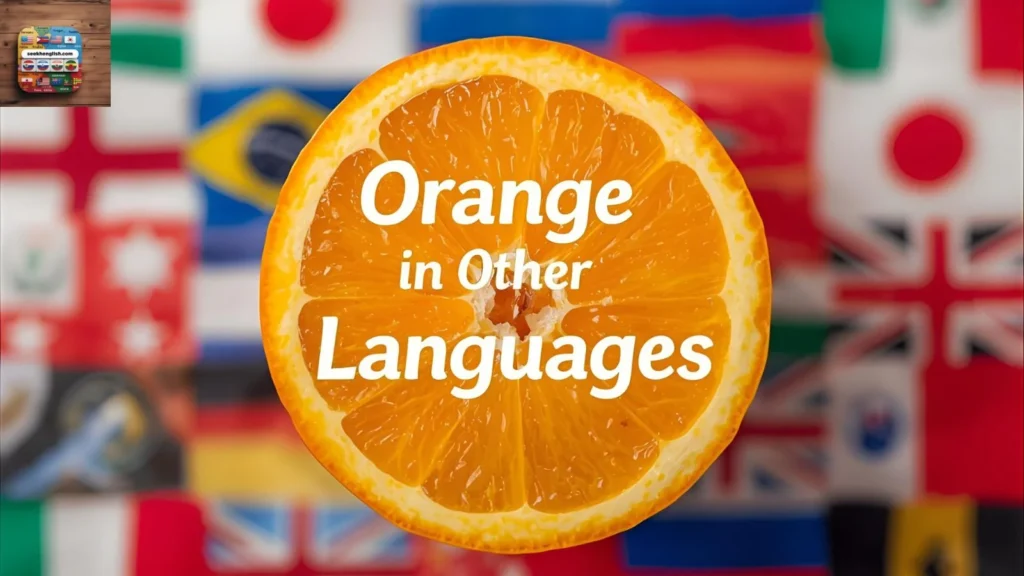
Read More: Winter in Other Languages
- English (🇺🇸) – Orange | Pronunciation: OR-inj | I ate a juicy orange for breakfast.
- Spanish (🇪🇸) – Naranja | Pronunciation: nah-RAHN-ha | Compré una naranja en el mercado. (I bought an orange at the market.)
- French (🇫🇷) – Orange | Pronunciation: oh-RAHNJ | L’orange est mon fruit préféré. (The orange is my favorite fruit.)
- German (🇩🇪) – Orange | Pronunciation: oh-RAHN-guh | Die Orange ist süß. (The orange is sweet.)
- Italian (🇮🇹) – Arancia | Pronunciation: ah-RAHN-chah | L’arancia è fresca. (The orange is fresh.)
- Portuguese (🇵🇹) – Laranja | Pronunciation: lah-RAHN-zhah | A laranja é doce. (The orange is sweet.)
- Dutch (🇳🇱) – Sinaasappel | Pronunciation: SEE-naas-ah-pel | Ik eet een sinaasappel. (I am eating an orange.)
- Russian (🇷🇺) – Апельсин (apelsin) | Pronunciation: ah-pyel-SEEN | Я ем апельсин. (I am eating an orange.)
- Mandarin Chinese (🇨🇳) – 橙子 (chéngzi) | Pronunciation: chuhng-zuh | 我喜欢吃橙子。 (I like to eat oranges.)
- Japanese (🇯🇵) – オレンジ (orenji) | Pronunciation: oh-REN-jee | オレンジを食べました。 (I ate an orange.)
- Korean (🇰🇷) – 오렌지 (orenji) | Pronunciation: oh-ren-jee | 오렌지를 샀어요. (I bought an orange.)
- Hindi (🇮🇳) – संतरा (santra) | Pronunciation: sun-trah | मैंने एक संतरा खाया। (I ate an orange.)
- Arabic (🇸🇦) – برتقال (burtuqal) | Pronunciation: bur-too-KAAL | أنا أحب البرتقال. (I love oranges.)
- Turkish (🇹🇷) – Portakal | Pronunciation: por-tah-KAHL | Portakal çok taze. (The orange is very fresh.)
- Greek (🇬🇷) – Πορτοκάλι (portokáli) | Pronunciation: por-toh-KAH-lee | Το πορτοκάλι είναι γλυκό. (The orange is sweet.)
- Thai (🇹🇭) – ส้ม (som) | Pronunciation: sohm | ฉันชอบกินส้ม. (I like eating oranges.)
- Vietnamese (🇻🇳) – Cam | Pronunciation: kahm | Tôi ăn một quả cam. (I ate an orange.)
- Swahili (🇰🇪) – Chungwa | Pronunciation: choong-wah | Nina kula chungwa. (I am eating an orange.)
- Bengali (🇧🇩) – কমলা (komola) | Pronunciation: koh-mo-lah | আমি একটি কমলা খেলাম। (I ate an orange.)
- Urdu (🇵🇰) – سنگترہ (sangtara) | Pronunciation: sung-ta-rah | میں نے سنگترہ خریدا۔ (I bought an orange.)
- Persian (🇮🇷) – پرتقال (porteghal) | Pronunciation: por-teh-ghaal | من پرتقال دوست دارم. (I like oranges.)
- Polish (🇵🇱) – Pomarańcza | Pronunciation: poh-mah-RAHN-cha | Lubię pomarańcze. (I like oranges.)
- Czech (🇨🇿) – Pomeranč | Pronunciation: poh-meh-rahnch | Jím pomeranč. (I am eating an orange.)
- Slovak (🇸🇰) – Pomaranč | Pronunciation: poh-mah-rahnch | Ten pomaranč je sladký. (The orange is sweet.)
- Hungarian (🇭🇺) – Narancs | Pronunciation: nah-rahnch | Vettem egy narancsot. (I bought an orange.)
- Finnish (🇫🇮) – Appelsiini | Pronunciation: ahp-pel-see-nee | Söin appelsiinin. (I ate an orange.)
- Swedish (🇸🇪) – Apelsin | Pronunciation: ah-pel-seen | Jag åt en apelsin. (I ate an orange.)
- Norwegian (🇳🇴) – Appelsin | Pronunciation: ah-pel-seen | Jeg kjøpte en appelsin. (I bought an orange.)
- Danish (🇩🇰) – Appelsin | Pronunciation: ah-pel-seen | Jeg spiste en appelsin. (I ate an orange.)
- Icelandic (🇮🇸) – Appelsína | Pronunciation: ahp-el-see-nah | Ég borðaði appelsínu. (I ate an orange.)
- Maltese (🇲🇹) – Larinġ | Pronunciation: lah-rinj | Ħadt larinġ. (I had an orange.)
- Irish (🇮🇪) – Oraiste | Pronunciation: oh-rish-teh | D’ith mé oraist. (I ate an orange.)
- Scottish Gaelic (🏴) – Orains | Pronunciation: oh-ransh | Dh’ith mi orains. (I ate an orange.)
- Welsh (🏴) – Oren | Pronunciation: oh-ren | Bwytais oren. (I ate an orange.)
- Basque (🇪🇸) – Laranja | Pronunciation: lah-rahn-ha | Laranja bat jan dut. (I ate an orange.)
- Catalan (🇪🇸) – Taronja | Pronunciation: tah-ron-jah | He menjat una taronja. (I ate an orange.)
- Galician (🇪🇸) – Laranxa | Pronunciation: lah-ran-sha | Comín unha laranxa. (I ate an orange.)
- Romanian (🇷🇴) – Portocală | Pronunciation: por-toh-kah-luh | Am mâncat o portocală. (I ate an orange.)
- Bulgarian (🇧🇬) – Портокал (portokal) | Pronunciation: por-toh-kahl | Ядох портокал. (I ate an orange.)
- Serbian (🇷🇸) – Поморанџа (pomoranđa) | Pronunciation: poh-moh-rahn-jah | Појео сам поморанџу. (I ate an orange.)
- Croatian (🇭🇷) – Naranča | Pronunciation: nah-rahn-cha | Pojeo sam naranču. (I ate an orange.)
- Bosnian (🇧🇦) – Narandža | Pronunciation: nah-rand-jah | Pojeo sam narandžu. (I ate an orange.)
- Slovenian (🇸🇮) – Pomaranča | Pronunciation: poh-mah-rahn-cha | Pojedel sem pomarančo. (I ate an orange.)
- Macedonian (🇲🇰) – Портокал (portokal) | Pronunciation: por-toh-kahl | Јадев портокал. (I ate an orange.)
- Albanian (🇦🇱) – Portokall | Pronunciation: por-toh-kahl | Hëngra një portokall. (I ate an orange.)
- Armenian (🇦🇲) – Նարինջ (narinj) | Pronunciation: nah-reench | Ես նարինջ կերա։ (I ate an orange.)
- Georgian (🇬🇪) – ფორთოხალი (portokhali) | Pronunciation: por-toh-khah-lee | მე ფორთოხალი ვჭამე. (I ate an orange.)
- Azerbaijani (🇦🇿) – Portağal | Pronunciation: por-tah-gahl | Portağal yedim. (I ate an orange.)
- Kazakh (🇰🇿) – Апельсин (apel’sin) | Pronunciation: ah-pel-seen | Мен апельсин жедім. (I ate an orange.)
- Uzbek (🇺🇿) – Apelsin | Pronunciation: ah-pel-seen | Men apelsin yedim. (I ate an orange.)
- Kyrgyz (🇰🇬) – Апельсин (apel’sin) | Pronunciation: ah-pel-seen | Мен апельсин жедим. (I ate an orange.)
- Tajik (🇹🇯) – Афлесун (aflesun) | Pronunciation: ah-fleh-soon | Ман афлесун хӯрдам. (I ate an orange.)
- Mongolian (🇲🇳) – Апельсин (apel’sin) | Pronunciation: ah-pel-seen | Би апельсин идсэн. (I ate an orange.)
- Malay (🇲🇾) – Oren | Pronunciation: oh-ren | Saya makan oren. (I ate an orange.)
- Indonesian (🇮🇩) – Jeruk | Pronunciation: juh-rook | Saya makan jeruk. (I ate an orange.)
- Filipino/Tagalog (🇵🇭) – Kahel | Pronunciation: kah-hel | Kumain ako ng kahel. (I ate an orange.)
- Hawaiian (🇺🇸) – ʻAlani | Pronunciation: ah-lah-nee | Ua ʻai au i ka ʻalani. (I ate an orange.)
- Maori (🇳🇿) – Karaka | Pronunciation: kah-rah-kah | I kai ahau i te karaka. (I ate an orange.)
- Samoan (🇼🇸) – Moli | Pronunciation: moh-lee | ‘Ua ‘ai a‘u i le moli. (I ate an orange.)
- Tongan (🇹🇴) – Moli | Pronunciation: moh-lee | Na‘a ku kai moli. (I ate an orange.)
- Fijian (🇫🇯) – Moli | Pronunciation: moh-lee | Au a kana moli. (I ate an orange.)
- Swati/Swazi (🇸🇿) – I-orenji | Pronunciation: ee-oh-ren-jee | Ngidle i-orenji. (I ate an orange.)
- Zulu (🇿🇦) – I-orenji | Pronunciation: ee-oh-ren-jee | Ngidle i-orenji. (I ate an orange.)
- Xhosa (🇿🇦) – I-orenji | Pronunciation: ee-oh-ren-jee | Nditye i-orenji. (I ate an orange.)
- Afrikaans (🇿🇦) – Lemoen | Pronunciation: leh-moon | Ek het ’n lemoen geëet. (I ate an orange.)
- Sesotho (🇱🇸) – Lamunu | Pronunciation: lah-moo-noo | Ke jele lamunu. (I ate an orange.)
- Tswana (🇧🇼) – Lamunu | Pronunciation: lah-moo-noo | Ke jele lamunu. (I ate an orange.)
- Shona (🇿🇼) – Orange | Pronunciation: oh-ren-jee | Ndakadya orange. (I ate an orange.)
- Chichewa (🇲🇼) – Lalanje | Pronunciation: lah-lahn-jeh | Ndidya lalanje. (I ate an orange.)
- Hausa (🇳🇬) – Lemun tsami | Pronunciation: leh-moon tsah-mee | Na ci lemun tsami. (I ate an orange.)
- Yoruba (🇳🇬) – Osan | Pronunciation: oh-san | Mo jẹ osan. (I ate an orange.)
- Igbo (🇳🇬) – Oroma | Pronunciation: oh-roh-mah | Nri m oroma. (I ate an orange.)
- Amharic (🇪🇹) – አረንጓዴ (arengwade) | Pronunciation: ah-ren-gwah-deh | አረንጓዴ በላሁ። (I ate an orange.)
- Somali (🇸🇴) – Liin macaan | Pronunciation: leen mah-caan | Waxaan cunay liin macaan. (I ate an orange.)
- Oromo (🇪🇹) – Birtukaan | Pronunciation: beer-too-kahn | Ani birtukaan nyaadhe. (I ate an orange.)
- Quechua (🇵🇪) – Laranxa | Pronunciation: lah-ran-sha | Laranxa mikhuni. (I eat an orange.)
- Aymara (🇧🇴) – Laranxa | Pronunciation: lah-ran-sha | Laranxa manq’ta. (I ate an orange.)
- Guarani (🇵🇾) – Narã | Pronunciation: nah-rah | Akaru narã. (I ate an orange.)
- Haitian Creole (🇭🇹) – Zoranj | Pronunciation: zoh-ranj | Mwen manje zoranj. (I ate an orange.)
- Jamaican Patois (🇯🇲) – Orange | Pronunciation: oh-rinj | Mi eat a orange. (I ate an orange.)
- Luxembourgish (🇱🇺) – Orange | Pronunciation: oh-ranj | Ech hu eng orange giess. (I ate an orange.)
- Esperanto (🌐) – Oranĝo | Pronunciation: oh-ran-jo | Mi manĝis oranĝon. (I ate an orange.)
- Latin (🇻🇦) – Aurantium | Pronunciation: ow-ran-tee-um | Ego comedi aurantium. (I ate an orange.)
- Sanskrit (🇮🇳) – नारङ्ग (naranga) | Pronunciation: nah-rang-ah | अहम् नारङ्गं खादामि। (I eat an orange.)
- Tibetan (🇨🇳) – ལི་གུང (li gung) | Pronunciation: lee-goong | ངས་ལི་གུང་ཟ་ཡོད། (I am eating an orange.)
Conclusion:
No matter where you go in the world, the word “orange” always brings a taste of sweetness, freshness, and cultural connection.
